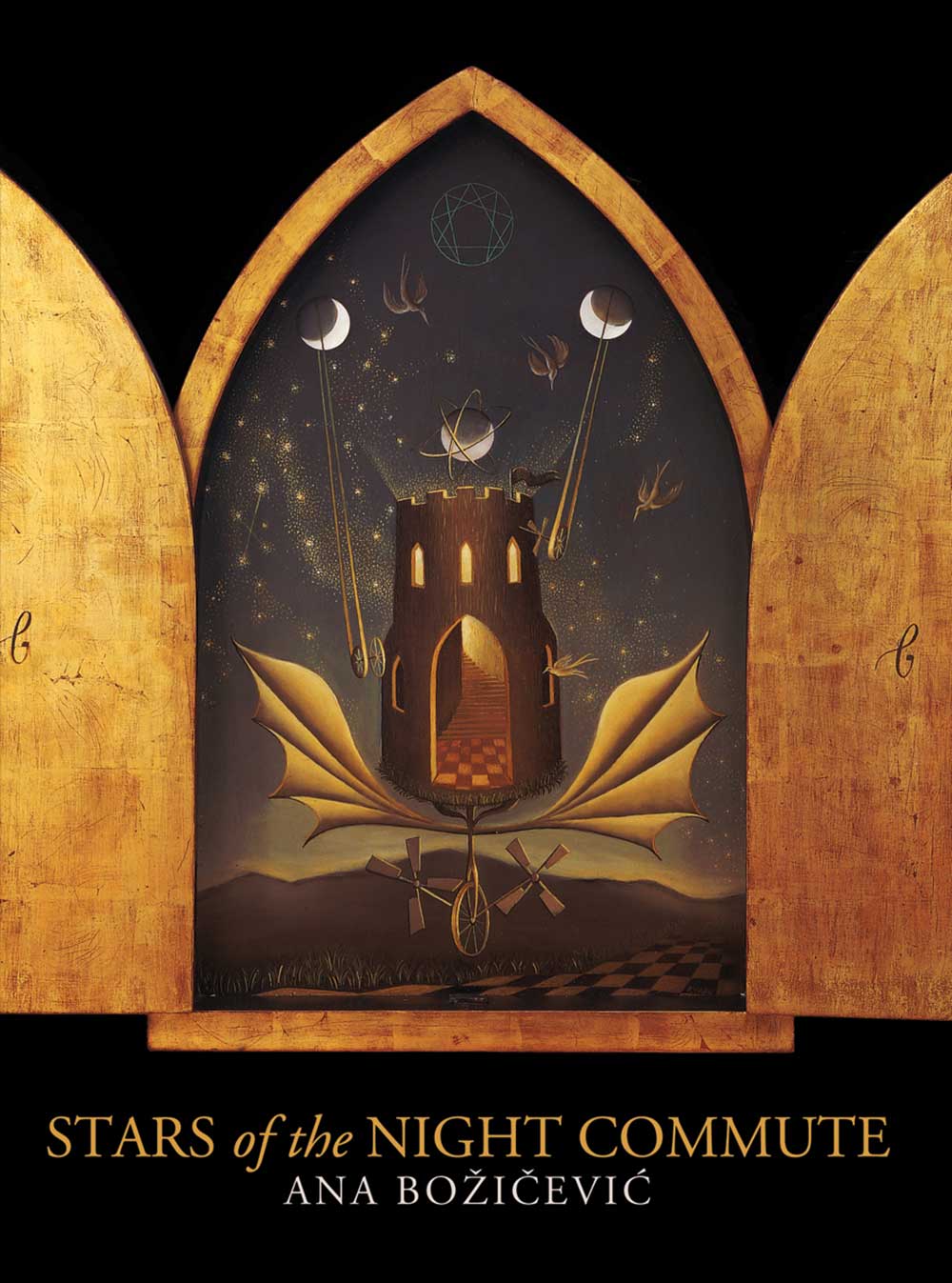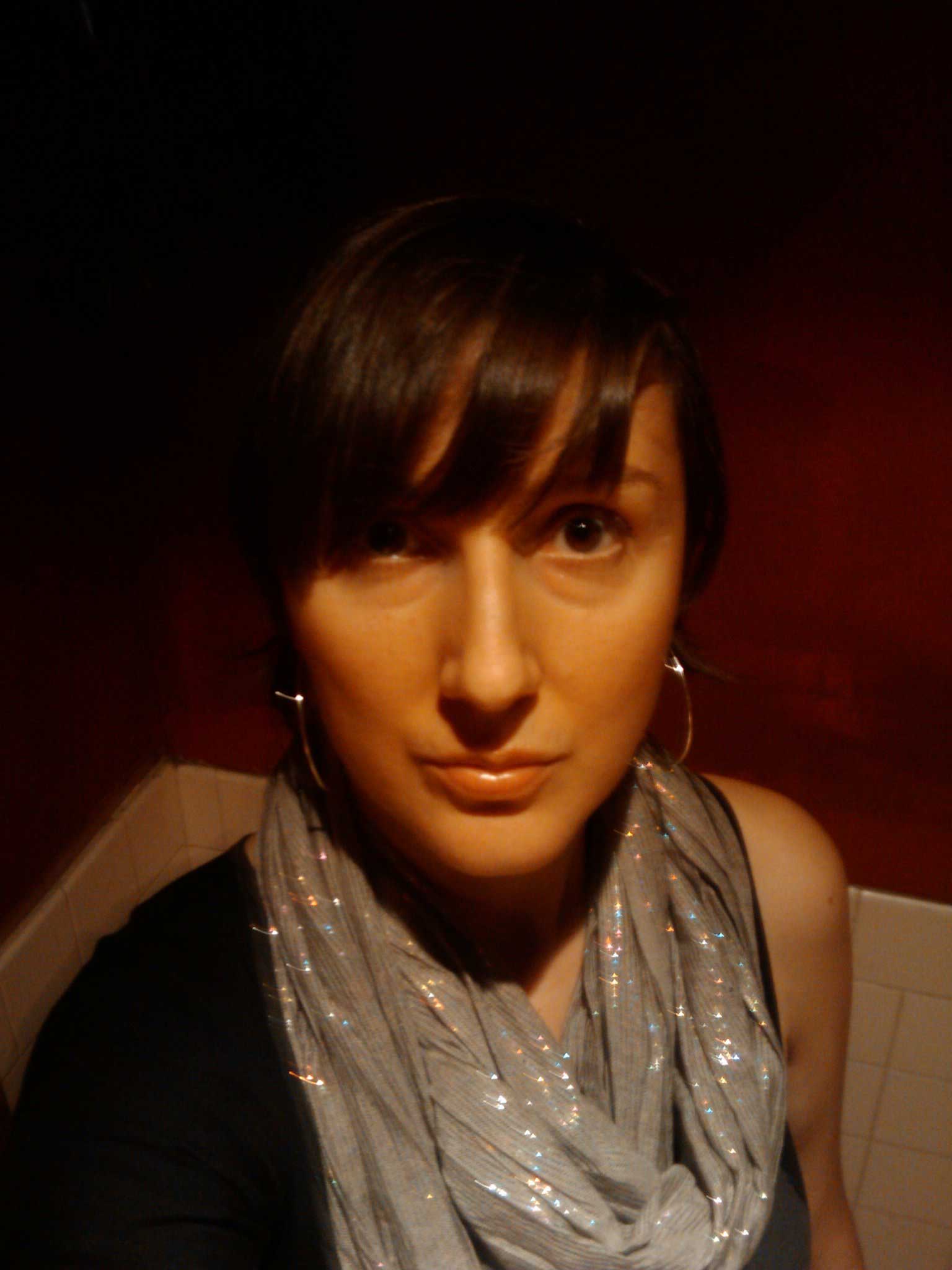
Stars of the Night Commute
by Ana Božičević
Poetry. 84 pages. Paperback.
A 2010 Lambda Award Finalist for Lesbian Poetry
Cover: Remedios Varo, Ícono, 1945 (Icon)
Reproduced with kind permission of Anna Alexandra Gruen

Stars of the Night Commute
by Ana Božičević
Poetry. 84 pages. Paperback.
A 2010 Lambda Award Finalist for Lesbian Poetry
Cover: Remedios Varo, Ícono, 1945 (Icon)
Reproduced with kind permission of Anna Alexandra Gruen
Though Bozicevic’s work does terrify, and so, by extension, is rightly ‘about’ terror . . . Stars is more accurately (and happily) about what an émigré does, heart and eyes intact and hungry for the redemptive and the beautiful, after having experienced all that is contrary to the love and kindness (that can be) human beings. (Nicole Mauro, Jacket) Thought-provoking, inspired and unexpected. Highly recommended. (Heather Aimee O’Neil, After Ellen) Ana Bozicevic’s work is sort of animist—it’s either about silence or the racket of the world. How does she do it? Clicks the switch to say it’s silent & it’s happening then on a distant tiny stage. She’s muttering, and then it’s a story and a very good one. I mean in poetry at some point you don’t know what the writer means. In Ana’s work I watch “it” vanish (all the time) & I trust it. (Eileen Myles) Ana Bozicevic’s work is filled with a wild freedom, and reading it often reminds me of reading Wallace Stevens, in that you know absolutely anything can happen next but whatever it is, it will be perfect. In her poems she expresses an attitude of solemn responsibility to history, both the world’s and her own, yet there is often a marvelous lightness, even playfulness about them…. An émigré from reality (in the form of one of modern time’s most monstrously and moronically cruel wars) and a Cassandra, she is able to perceive with the eyes of language—then render with lyrical immediacy—the experience of our collective sleepwalking soul, who may well soon awaken to discover that its terror was not a dream. (Franz Wright) Stars of the Night Commute haunts in three dimensions, knit by a below-words rumble in the sure rhythm of dreams. Many of the poems carry a shamanistic, elemental quality, as if real matter were articulating out of word-fragments. Bozicevic writes, “At the end of poetry the poem can no longer be remote.” If this is “the end of poetry,” perhaps poetry is, after all, reaching forward back to its beginning. (Annie Finch) Ana Bozicevic’s poetry has everything—a mastery of language, a distinct and singular voice and a worldview so visionary and all-encompassing, so as to both terrify and astound. The words bristle with life, and they command the deepest reverence for the Ineffable, for pure Being. This poetry is clever without being shallow, and this is truly rare. Silence is my most honest response to her work, but a silence rooted in respect and awe for that which is truly great art. (Noelle Kocot)
Though Bozicevic’s work does terrify, and so, by extension, is rightly ‘about’ terror . . . Stars is more accurately (and happily) about what an émigré does, heart and eyes intact and hungry for the redemptive and the beautiful, after having experienced all that is contrary to the love and kindness (that can be) human beings. (Nicole Mauro, Jacket) Thought-provoking, inspired and unexpected. Highly recommended. (Heather Aimee O’Neil, After Ellen) Ana Bozicevic’s work is sort of animist—it’s either about silence or the racket of the world. How does she do it? Clicks the switch to say it’s silent & it’s happening then on a distant tiny stage. She’s muttering, and then it’s a story and a very good one. I mean in poetry at some point you don’t know what the writer means. In Ana’s work I watch “it” vanish (all the time) & I trust it. (Eileen Myles) Ana Bozicevic’s work is filled with a wild freedom, and reading it often reminds me of reading Wallace Stevens, in that you know absolutely anything can happen next but whatever it is, it will be perfect. In her poems she expresses an attitude of solemn responsibility to history, both the world’s and her own, yet there is often a marvelous lightness, even playfulness about them…. An émigré from reality (in the form of one of modern time’s most monstrously and moronically cruel wars) and a Cassandra, she is able to perceive with the eyes of language—then render with lyrical immediacy—the experience of our collective sleepwalking soul, who may well soon awaken to discover that its terror was not a dream. (Franz Wright) Stars of the Night Commute haunts in three dimensions, knit by a below-words rumble in the sure rhythm of dreams. Many of the poems carry a shamanistic, elemental quality, as if real matter were articulating out of word-fragments. Bozicevic writes, “At the end of poetry the poem can no longer be remote.” If this is “the end of poetry,” perhaps poetry is, after all, reaching forward back to its beginning. (Annie Finch) Ana Bozicevic’s poetry has everything—a mastery of language, a distinct and singular voice and a worldview so visionary and all-encompassing, so as to both terrify and astound. The words bristle with life, and they command the deepest reverence for the Ineffable, for pure Being. This poetry is clever without being shallow, and this is truly rare. Silence is my most honest response to her work, but a silence rooted in respect and awe for that which is truly great art. (Noelle Kocot)
Ana Božičević
Born in Zagreb, Croatia, Ana Božičević emigrated to New York City in 1997 and studied at Hunter College and at The Graduate Center, CUNY. In 2009 Tarpaulin Sky Press published her debut book of poem, Stars of the Night Commute, which would go on to be named a 2010 Lambda Literary Award finalist for Lesbian Poetry. Three years later, Božičević would win the award with Rise in the Fall, published by Birds LLC. Publishers Weekly calls her third book, Joy of Missing Out (Birds, 2017), “another plaudit-worthy collection that is even more humorous, complex, and responsive to the world,” whose author is “a poet of quiet social revolt .. a contemplative voice that questions contemporary powers: the government, the police, the Internet….” Božičević has received a “40 Under 40: The Future of Feminism” award from Feminist Press, a PEN American Center/NYSCA grant for translating Zvonko Karanović’s It Was Easy to Set the Snow on Fire (Phoneme Media, 2017), and she has worked for the PEN American Center, the Center for the Humanities of the Graduate Center, CUNY, and the Bruce High Quality Foundation. Read more at our author page for Ana Božičević and visit Ana’s website at at AnaBozicevic.com


Ana Božičević
Born in Zagreb, Croatia, Ana Božičević emigrated to New York City in 1997 and studied at Hunter College and at The Graduate Center, CUNY. In 2009 Tarpaulin Sky Press published her debut book of poem, Stars of the Night Commute, which would go on to be named a 2010 Lambda Literary Award finalist for Lesbian Poetry. Three years later, Božičević would win the award with Rise in the Fall, published by Birds LLC. Publishers Weekly calls her third book, Joy of Missing Out (Birds, 2017), “another plaudit-worthy collection that is even more humorous, complex, and responsive to the world,” whose author is “a poet of quiet social revolt .. a contemplative voice that questions contemporary powers: the government, the police, the Internet….” Božičević has received a “40 Under 40: The Future of Feminism” award from Feminist Press, a PEN American Center/NYSCA grant for translating Zvonko Karanović’s It Was Easy to Set the Snow on Fire (Phoneme Media, 2017), and she has worked for the PEN American Center, the Center for the Humanities of the Graduate Center, CUNY, and the Bruce High Quality Foundation. Read more at our author page for Ana Božičević and visit Ana’s website at at AnaBozicevic.com